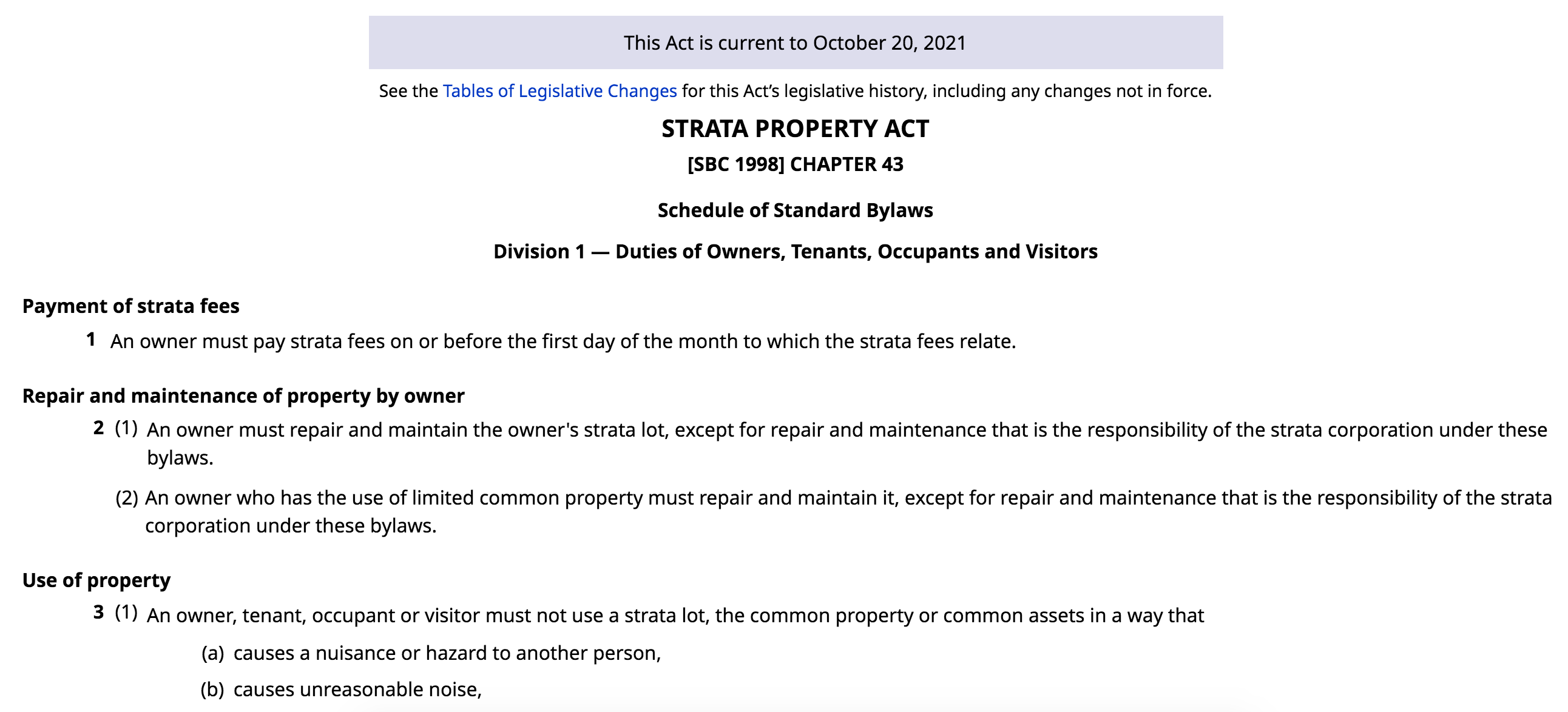Strata bylaws and rules – setting the stage for neighbours living in harmony

I’ve happily lived in apartments for nearly 30 years, almost entirely in the neighbourhoods of downtown Vancouver. I love stepping out my front door and tackling the tough decision of whether to visit Pacific Roasters, Buro or explore another of the cafes within a 10 minute walk. A favourite pastime is what we call ‘Vancouver days’ (I’m sure we’re not original) where we grab a coffee and wander the seawall or the myriad of restaurants, shops, and parks. Condo living makes this lifestyle possible.
To fully enjoy your lifestyle, you need to connect with the community within your building just as much as the neighbourhood.
A Strata Corporation (Strata) is the overarching legal entity for a condo development. The Strata is comprised of all the owners where each owns their home plus a portion of the common assets including land. At every Annual General Meeting (AGM), a Strata Council is elected from among the owners and is responsible for the operation of the building according to its bylaws and any rules. The ultimate goal being a cohesive community of residents.
Each building has its own flavour. Do they allow pets? If so, which type of pets and how many? Could a neighbouring unit be used as a short-term rental? Can you barbecue on your balcony? Grab a coffee and delve into the world of bylaws and rules.
Standard bylaws and rules
Every building with have a set of bylaws. You’ll have deja-vu if you read the bylaws for a number of stratas as the BC Government has a standard set of bylaws that Developers tailor to what they believe will attract their target buyers. That said, there are substantial differences between buildings.
Bylaws set the framework for how the Strata functions, the responsibilities of the Strata as well as individual owners, and how building residents live together. This is where you’ll find the specifications for rentals, pets, renovations, smoking and so on.
Link: BC Government standard set of bylaws
Link: In-depth review of the main bylaws (forthcoming)
Some stratas have rules in addition to bylaws. Rules apply to the use of common property such as fitness centres, meeting rooms, and outdoor common patios. They usually stipulate the operating hours, group limits, booking procedures and similar items. While there’s no standard format, rules are straightforward.
Owners can alter bylaws and rules
As buildings can be over 100 years old, it’s no surprise that the needs of the owners can evolve over time. Instead of having to live according to outdated conditions, owners can vote to update their Strata’s bylaws and rules.
The typical pathway is that the Strata Council notices an ongoing issue and they propose a new or replacement bylaw to owners at an AGM or Special General Meeting (SGM). They’ll review the reasoning for the change and owners will vote on whether to approve the change. This frequently occurs and why you should pay particular attention to the outcomes of AGMs and SGMs.
As an example, the City of Vancouver used to limit home rentals to 30 days or more. In 2018, the City changed course and now allows rentals less than 30 days and, although City approval of such rentals is contingent upon Strata approval, many Stratas took the extra step of adding bylaws prohibiting short-term rentals in their respective buildings.
Rules can be enacted in a similar manner or enacted solely by the Strata Council. If the latter, the altered rule must be ratified by a vote by owners at the next AGM or SGM or it’s terminated.
Bylaw and rule contraventions
You may be surprised to learn that I want to see that a Strata issues fines when appropriate. It helps provide a stable community for all residents. In my view, never issuing fines or issuing an excessive number of fines both may signal that there’s an overarching issue with the building’s community. I’ve commonly seen fines issued for noise, improper rentals, and improper disposal of waste.
In a nod to reasonableness, Stratas usually warn people when they’re contravening a bylaw or rule. If the issue persists, they then usually graduate to issuing fines. While rare, chronic offenders can find themselves in lawyer-land.
Below are the maximum fines allowed by the Strata Property Act:
- $200 for contravening a bylaw, reissued every 7 days for a continuing offence
- $50 for contravening a rule, reissued every 7 days for a continuing offence
- $500 for contravening a bylaw that prohibits or limits rental, reissued every 7 days for a continuing offence
- $1000 for contravening a bylaw that limits short-term rentals, reissued daily for a continuing offence
If a tenant or visitor contravenes a bylaw or rule, the fine is applied to the owner’s account. Owner’s renting their condos need to make sure their tenant’s are aware of and will adhere to the bylaws and rules.
This is probably more than you ever wanted to know about bylaw and rules. In a subsequent post, I’ll review the main bylaws to help you assess prospective homes.
Feel free to reach out with questions or comments.
Jason Hutchison
604.314.7138 [email protected]
Credit: the header image is extracted from the first page of the standard set of bylaws.
